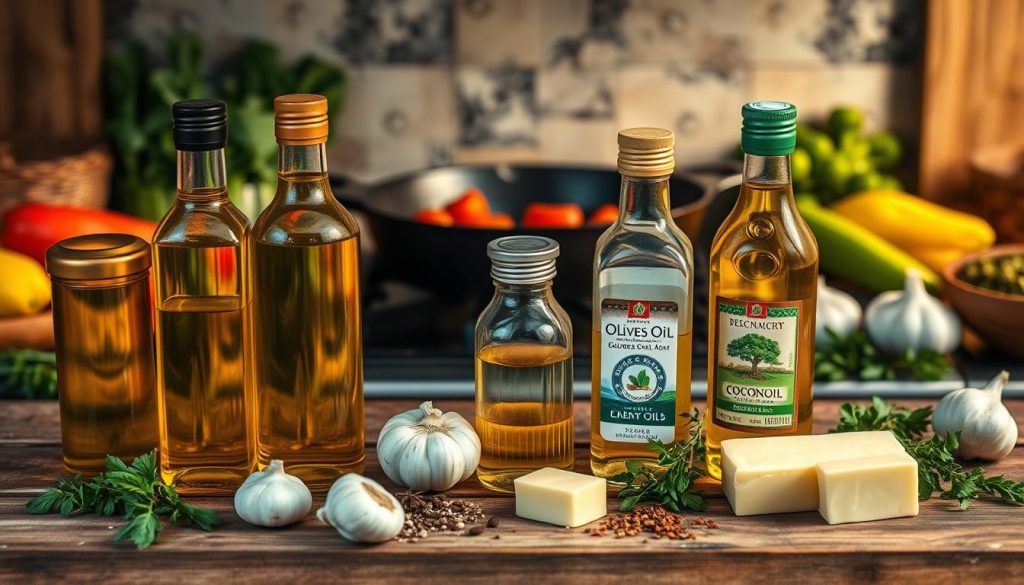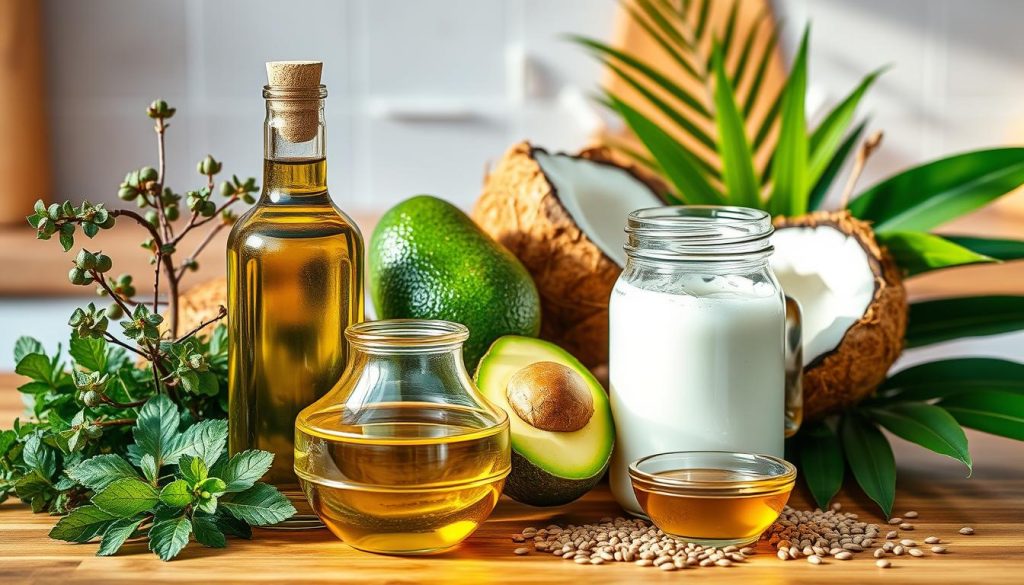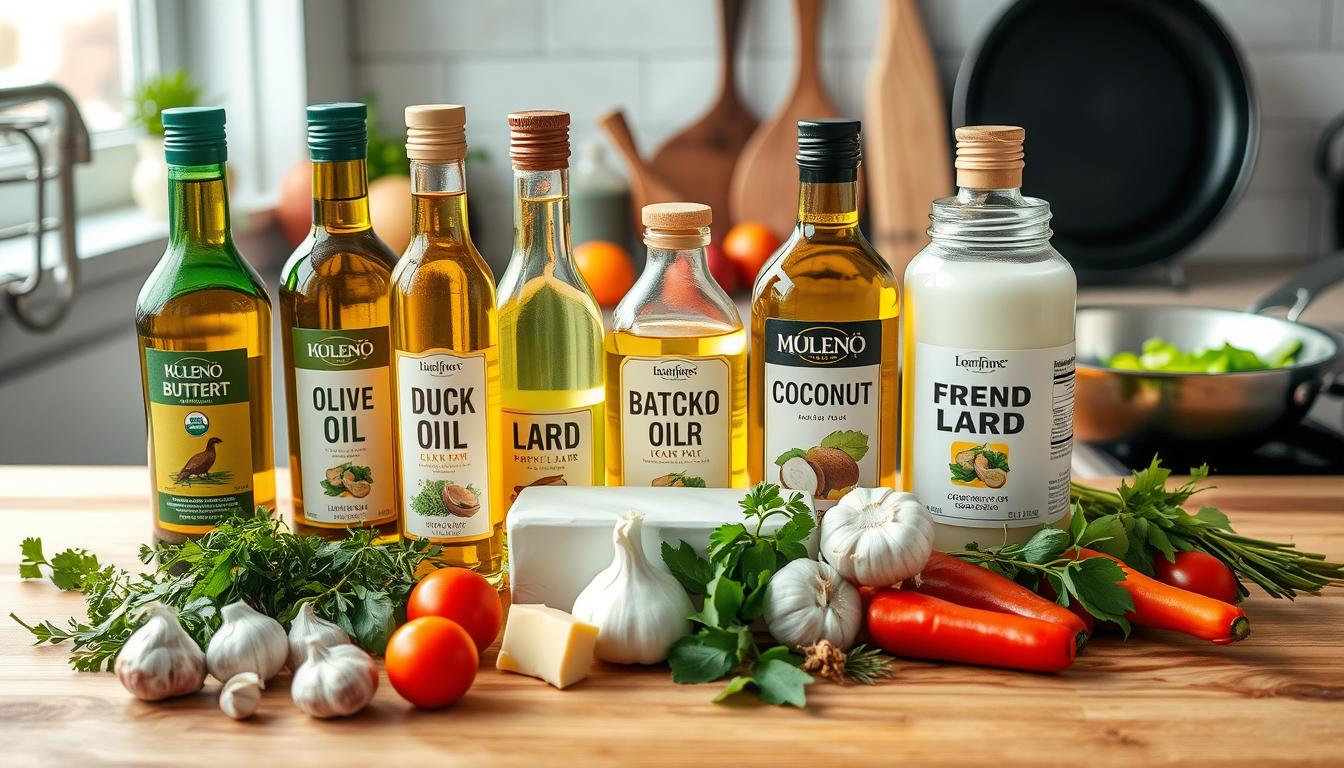Duck fat is a culinary treasure, loved for its rich flavor and versatility. It’s great for roasting, sautéing, and baking because it has a high smoke point of 375 degrees F. But, its high cost and limited availability can be a problem. That’s why duck fat substitutes are a good option.
This guide will help you find cooking alternatives that taste great but are cheaper. Duck fat has a low saturated fat content of 33%, compared to butter’s 51%. It also lasts a long time, up to one year unopened and six months once opened.
Duck fat makes roasted potatoes, fries, and seared meats crispy and flavorful. It’s a favorite among chefs. But, if you’re looking for healthier, affordable options, there are many choices. These can enhance flavor and support healthy cooking.
Understanding Duck Fat
When you start cooking, you might come across duck fat. It’s a fat from ducks, known for its rich taste and many uses in the kitchen. Understanding duck fat composition helps you see its value and health perks.
What Is Duck Fat?
Duck fat is mostly fats, with 33% saturated, 49% monounsaturated, and 13% polyunsaturated. This mix makes it great for cooking. It can handle high heat, perfect for frying and roasting.
It keeps well, too. Unopened duck fat lasts a year in a cool place. Once opened, it’s good for six months in the fridge. Duck fat from breast lasts one to two weeks in the fridge. Freezing it can extend its life up to six months.
Why Use Duck Fat in Cooking?
Adding duck fat to your dishes brings a special richness. It adds a subtle duck flavor, making food more savory. It’s perfect for roasted potatoes and crispy veggies, making them taste amazing.
Duck fat is also good for you. Its fats might help lower bad cholesterol and heart disease risk. It’s better than butter, which has more saturated fat. So, using duck fat can make your food taste great and be healthier.
Benefits of Using Duck Fat Substitutes
Using duck fat substitutes can be good for your health and your wallet. Many options have unique tastes and health perks. They are also easy to find and affordable.
Health Considerations
Duck fat has a lot of saturated fats, which isn’t great for your heart. But, oils like olive, avocado, and macadamia are full of good fats. They help your heart and taste great.
Lard, tallow, and peanut oil are also good choices. They add flavor and are healthy for cooking.
Accessibility and Cost
When it comes to cooking fats, cost matters. Duck fat is pricey and hard to find. But, oils like vegetable, olive, and chicken fat are cheap and easy to get.
| Cooking Oil | Saturated Fat Content | Monounsaturated Fat Content | Smoke Point (°F) | Calories (per tablespoon) |
|---|---|---|---|---|
| Duck Fat | 33% | 49% | 375 | 130 |
| Olive Oil | 14% | 73% | 375 | 120 |
| Avocado Oil | 12% | 76% | 520 | 124 |
| Peanut Oil | 17% | 46% | 450 | 120 |
| Lard | 39% | 45% | 370 | 115 |
Duck Fat Substitute Guide: Top Alternatives
Finding the best duck fat substitutes can make your cooking better. Chicken fat, ghee, and macadamia oil are great options. Each one brings something special to your dishes.
Chicken Fat (Schmaltz)
Schmaltz, or chicken fat, tastes like duck fat but is cheaper. It’s perfect for Jewish dishes because of its buttery flavor. It’s a top choice for those who want flavor without the high cost.
Ghee
Ghee is great for cooking at high temperatures because it has a smoke point of 480 degrees Fahrenheit. It’s perfect for roasting or frying. Its rich taste makes it a favorite among cooks.
Macadamia Oil
Macadamia oil is a fantastic duck fat substitute. It tastes buttery and is good for your heart because of its healthy fats. Using it in cooking adds flavor and boosts your health.
| Substitute | Flavor Profile | Smoke Point (°F) | Price per Ounce |
|---|---|---|---|
| Schmaltz | Rich, buttery | 375 | 0.10 – 0.50 |
| Ghee | Rich, nutty | 480 | 0.70 – 0.90 |
| Macadamia Oil | Buttery, nutty | 410 | 0.20 – 0.30 |
Cooking with Duck Fat Substitutes
Cooking with duck fat substitutes opens up a world of possibilities. It offers both versatility and flavor. Whether you’re looking for cooking tips or experimenting with recipes, understanding these alternatives is key. Many substitutes provide rich textures and flavors similar to duck fat, allowing you to customize your dishes effectively.
Best Uses for Substitutes
Each substitute for duck fat has unique qualities. These qualities make them suitable for various culinary applications:
- Chicken Fat (Schmaltz) – A flavorful option for frying and roasting, chicken fat offers essential fatty acids necessary for proper cell function.
- Ghee – Due to its higher smoke point compared to regular butter, ghee is ideal for frying and sautéing while providing a rich flavor profile.
- Olive Oil – High in monounsaturated fats, olive oil not only enhances flavor but also supports heart health by lowering cholesterol levels.
- Butter – Clarified butter is best for sautéing, while regular butter shines in baking applications, when blended with duck fat.
Creative Recipes Using Alternatives
Incorporating substitutes into your cooking can lead to delightful dishes. Here are some inventive recipes using duck fat alternatives:
- Garlic Confit – Prepare this flavorful dish in just 15 minutes by simmering garlic in chicken fat or ghee.
- Crispy Potatoes – Roast potatoes in goose fat to achieve a crispy, golden-brown exterior and creamy interior that rivals any traditional recipe.
- Extra Rich Mayonnaise – Enhance homemade mayonnaise by substituting duck fat for regular oil, imparting a rich umami flavor.
- Roasted Vegetable Medley – Brush vegetables with ghee before roasting for a delicious side that complements any meal.

As you explore these options, remember that duck fat substitutes not only maintain rich flavors. They can also be tailored to suit your cooking style. With the right combinations and techniques, your culinary creations will celebrate the essence of duck fat. They will promote diverse nutrition and taste.
Texture and Flavor Considerations
Choosing the right substitute for duck fat is key. Duck fat adds a rich, savory flavor and smooth texture to dishes. Each alternative has its own taste and cooking style, changing how your food tastes and feels.
How Substitutes Impact Your Dishes
Different fats change how your food tastes and feels. Ghee adds a nutty warmth, great for many dishes. Olive oil brings a fruity taste, perfect for Mediterranean food. Coconut oil gives a unique flavor for both sweet and savory dishes.
Butter is rich but has a lower smoke point. It’s best for baking and low-heat cooking. The right fat can make your dish better and more appealing.
Choosing the Right Substitute
Think about your cooking method and the flavor you want. Duck fat is versatile, but substitutes need to match your needs. For high heat, ghee is a good choice because of its high smoke point.
Neutral vegetable oils are great for frying and roasting. For healthier options, try macadamia oil. It’s plant-based and has a similar feel to duck fat. Knowing these details helps you make dishes that taste good and are healthy.
Healthier Substitutes for Duck Fat
Looking for healthier alternatives to duck fat? Several plant-based options are great. They meet different dietary needs and offer health benefits. Choosing the right cooking oils can make your food better and improve your health.
Plant-Based Options
Plant-based fats offer a variety of healthy cooking oils. Some popular ones are:
- Olive oil
- Avocado oil
- Sunflower oil
These oils have less saturated fat than duck fat, which has 33%. They are full of good fats that help your heart. They’re perfect for those who eat vegetarian or healthily, without losing flavor.
Animal Fats vs. Vegetable Oils
Animal fats like lard and ghee have their benefits. But, plant-based fats are lower in calories. Here’s a comparison:
| Fat Type | Saturated Fat (%) | Caloric Density (per tablespoon) | Heart Health Benefits |
|---|---|---|---|
| Duck Fat | 33 | 115 | May reduce LDL cholesterol |
| Butter | 51 | 102 | High in saturated fat |
| Olive Oil | 14 | 119 | High in monounsaturated fats |
| Avocado Oil | 12 | 124 | Supports heart health |
This table shows the fat content and health effects. It helps you choose better cooking oils. Knowing these options lets you add healthy fats to your meals without losing flavor.

Popular Recipes Featuring Duck Fat Alternatives
Exploring duck fat alternatives opens up a world of flavors. You can use different fats for frying and baking. This way, you can enjoy the rich taste of duck fat without using it. It’s a great way to try new recipes and keep cooking exciting.
Frying and Sautéing
Alternatives like ghee and chicken fat (schmaltz) are perfect for frying. They add unique flavors to your dishes. For example, frying chicken in schmaltz gives it a special taste.
Using duck fat also makes fried foods like french fries or potato wedges even better. They become crispy and full of flavor.
Baking and Roasting
For baking, try using vegetable shortening or olive oil. Mixing duck fat with butter in recipes like Duck-Fat Shortbread Cookies adds a rich taste. Roasting vegetables with oils like macadamia or ghee makes them tender and tasty.
In Gascon recipes, duck fat in cornbread brings out a deep flavor. It’s a game-changer for the dish.
| Recipe | Cooking Method | Key Ingredients | Substitutes Suggested |
|---|---|---|---|
| Chicken Fried in Schmaltz | Frying | Chicken, Schmaltz, Spices | Ghee, Duck Fat |
| Duck-Fat Shortbread Cookies | Baking | Flour, Butter, Duck Fat | 50% Duck Fat |
| Roasted Vegetables | Roasting | Seasonal Vegetables, Ghee | Macadamia Oil |
| Gascon Sourdough Cornbread | Baking | Cornmeal, Duck Fat | Butter |
Conclusion
Exploring duck fat substitutes can open up new culinary adventures. You can use chicken fat, ghee, or plant-based oils. These options make cooking more versatile and help you follow a healthy eating guide.
These alternatives offer unique flavors and health benefits. For example, duck fat-based emulsions can improve food quality during storage. So, you can keep the taste and quality of your dishes high while staying healthy.
Adding these substitutes to your cooking can make every meal a treat. You get to enjoy great flavors without harming your health. This mix of taste, health, and versatility can make cooking a joy that you’ll look forward to every day.
Source Links
- https://www.duckchar.com/duck-fat?srsltid=AfmBOopIjWovd_36qp-tDSgBYxxYNLS3BSDjLAwtn_i-0B-6NfcmiAs2
- https://www.dartagnan.com/duck-fat-recipes-and-uses.html?srsltid=AfmBOoqTxNtEf9kVR6vmU10lwS0GO7fagxOeKXJtWgXsX-TIcTuYDma2
- https://thecoconutmama.com/7-best-duck-fat-substitutes/
- https://www.duckchar.com/duck-fat?srsltid=AfmBOoqz6a-HqsB-e4wY3G2oJ5BFJaga4WYRiWhjFfGYK4U0DeJ_Ch43
- https://www.dartagnan.com/duck-fat-recipes-and-uses.html?srsltid=AfmBOoqx5LxdvNEQsyojAf4LsTAI3EDdEalSNrovlkHBj_ZeqKkQJ6o4
- https://discover.texasrealfood.com/swap-and-savor/duck-fat-substitutes
- https://www.healthline.com/nutrition/is-duck-fat-healthy
- https://thecoconutmama.com/duck-fat-vs-palm-oil/
- https://gustomeadow.com/duck-fat-substitutes/
- https://www.dartagnan.com/duck-fat-recipes-and-uses.html?srsltid=AfmBOoq6YglY-hVHGCEH3ap3r_8mvO9AmYWXKSerElRAvNxD8upQbfM6
- https://thekitchencommunity.org/duck-fat-substitutes/
- https://discover.texasrealfood.com/swap-and-savor/how-to-substitute-duck-fat-for-butter
- https://northernnester.com/duck-fat-substitute/
- https://www.gourmetfoodstore.com/duck-fat-101
- https://www.duckchar.com/duck-fat?srsltid=AfmBOoqg-ZSgfMacuuMO0CKeGL3TwabBPfuHRYBG3XBsXsLgxuKd-Wnf
- https://www.simplyrecipes.com/recipes/easy_duck_confit/
- https://www.saveur.com/story/food/best-duck-recipes/
- https://center-of-the-plate.com/2019/02/10/the-best-10-ways-to-cook-with-duck-fat/
- https://pmc.ncbi.nlm.nih.gov/articles/PMC8774960/
- https://drcate.com/list-of-good-fats-and-oils-versus-bad/
